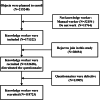Association between dietary diversity, sedentary time outside of work and depressive symptoms among knowledge workers: a multi-center cross-sectional study
- PMID: 38166945
- PMCID: PMC10762993
- DOI: 10.1186/s12889-023-17567-7
Association between dietary diversity, sedentary time outside of work and depressive symptoms among knowledge workers: a multi-center cross-sectional study
Abstract
Background: Low-diversity diets and sedentary status are risk factors for depressive symptoms, while knowledge workers were ignored before. The purpose of this current study was to examine the relationship between dietary diversity, sedentary time spent outside of work, and depressive symptoms among knowledge workers.
Study design and methods: This was a multicenter and cross-sectional design that included 118,723 knowledge workers. Participants self-reported online between January 2018 and December 2020. Demographic information, the Dietary Diversity Scale, the Patient Health Questionnaire-9, dietary habits (which included eating three meals on time, midnight snacking, overeating, social engagement, coffee consumption, sugary drink consumption, smoking and alcohol use), sedentary time spent outside of work and physical activity were investigated.
Results: The relationships between demographic information, dietary habits and dietary diversity, and depressive symptoms were estimated. Compared with the first and second levels of dietary diversity, the third level of dietary diversity (OR: 0.91; 95% CI: 0.84-0.98) reduced the risk of depressive symptoms. Knowledge workers with different degrees of sedentary status (2-4 h (OR: 1.11; 95% CI: 1.07-1.14), 4-6 h (OR: 1.21; 95% CI: 1.17-1.26), and > 6 h (OR: 1.49; 95% CI: 1.43-1.56), presented a progressively higher risk of depressive symptoms.
Conclusion: High amounts of sedentary time spent after work and low levels of dietary diversity are risk factors for depressive symptoms. In addition, an irregular diet and overeating are also major risk factors for knowledge workers.
Keywords: Cross sectional; Depressive symptoms; Dietary diversity; Knowledge workers; Sedentary.
© 2023. The Author(s).
Conflict of interest statement
The authors declare no conflict of interest.
Figures



Similar articles
-
Association of sedentary behaviour patterns with dietary and lifestyle habits among public school teachers: a cross-sectional study.BMJ Open. 2020 Jan 23;10(1):e034322. doi: 10.1136/bmjopen-2019-034322. BMJ Open. 2020. PMID: 31980510 Free PMC article.
-
Dietary diversity, physical activity and depressive symptoms among middle-aged women: A cross-sectional study of 48,637 women in China.J Affect Disord. 2023 Jan 15;321:147-152. doi: 10.1016/j.jad.2022.10.038. Epub 2022 Oct 28. J Affect Disord. 2023. PMID: 36330900
-
Bidirectional associations between dietary diversity and depressive symptoms in Chinese adult women: A retrospective cohort study.J Affect Disord. 2024 Apr 15;351:683-693. doi: 10.1016/j.jad.2024.01.258. Epub 2024 Feb 3. J Affect Disord. 2024. PMID: 38316259
-
Movement behaviors and their association with depressive symptoms in Brazilian adolescents: A cross-sectional study.J Sport Health Sci. 2022 Mar;11(2):252-259. doi: 10.1016/j.jshs.2020.08.003. Epub 2020 Aug 11. J Sport Health Sci. 2022. PMID: 32791204 Free PMC article.
-
Workplace interventions for increasing standing or walking for decreasing musculoskeletal symptoms in sedentary workers.Cochrane Database Syst Rev. 2019 Nov 17;2019(11):CD012487. doi: 10.1002/14651858.CD012487.pub2. Cochrane Database Syst Rev. 2019. PMID: 31742666 Free PMC article.
Cited by
-
Dietary diversity among women with depressive and generalized anxiety symptoms in Nepal.Sci Rep. 2024 Jul 31;14(1):17688. doi: 10.1038/s41598-024-68346-2. Sci Rep. 2024. PMID: 39085309 Free PMC article.
-
Effect of dietary diversity on depression and depressive symptoms: a systematic review and meta-analysis of cross-sectional studies.BMC Public Health. 2025 Jul 2;25(1):2203. doi: 10.1186/s12889-025-23240-y. BMC Public Health. 2025. PMID: 40604712 Free PMC article. Review.
-
Association of sugar consumption with risk of depression and anxiety: a systematic review and meta-analysis.Front Nutr. 2024 Oct 16;11:1472612. doi: 10.3389/fnut.2024.1472612. eCollection 2024. Front Nutr. 2024. PMID: 39479195 Free PMC article.
References
-
- Steiger DM, Steiger NM. Instance-based cognitive mapping: a process for discovering a knowledge worker's tacit mental model. Knowl Manag Res Pract. 2008;6(4):312–321. doi: 10.1057/kmrp.2008.19. - DOI
-
- Nelson SB, Jarrahi MH, Thomson L. Mobility of knowledge work and affordances of digital technologies. Int J Inf Manage. 2017;37(2):54–62. doi: 10.1016/j.ijinfomgt.2016.11.008. - DOI
-
- Florida R. America's looming creativity crisis. Harv Bus Rev. 2004;82(10):122–4, 6, 8 passim. - PubMed
Publication types
MeSH terms
Grants and funding
LinkOut - more resources
Full Text Sources
Medical

